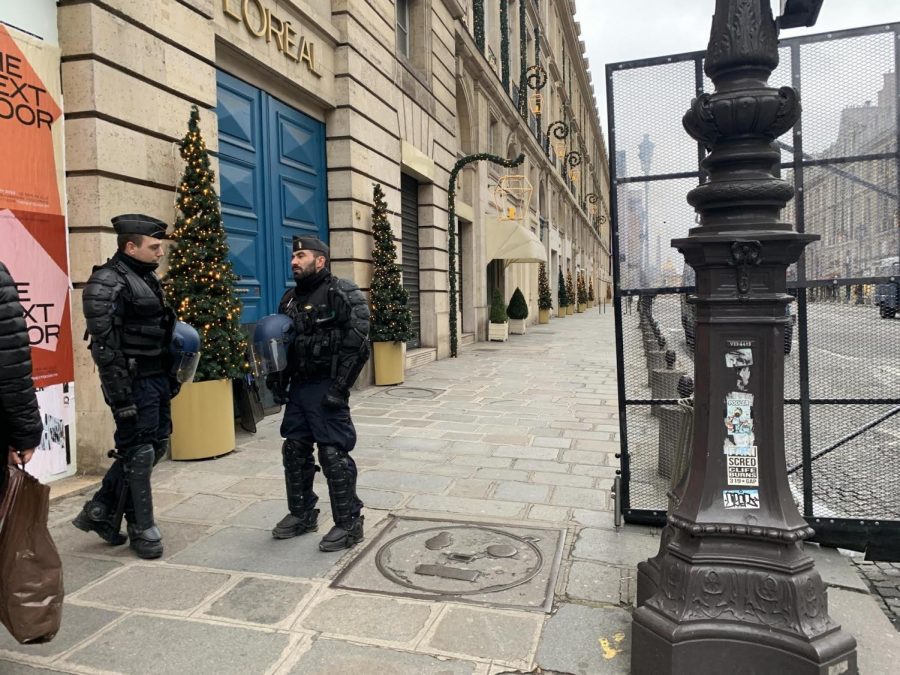‘We’re here when they’re making history’: Paris J-Term students encounter Yellow Vest riots
French police officers watched over yellow vest demonstrations in Paris, France.
January 22, 2019
Getting locked in the Luxembourg Gardens with Yellow Vest protesters was not on the agenda for sophomore fashion studies major Elon Byers during her J-Term study abroad trip in Paris, France.
“I knew they were in the process of having a revolution [and] that they were rising up against the mistreatment in their workplaces,” Byers said. “I knew they weren’t looking to harm people—only to get their point across.”
Students on the 16-day Creative Writing J-Term trip in Paris focused on daily journals, studying expatriate authors James Baldwin and Ernest Hemingway and workshopped creative writing, Byers said. Some students applied for the program just to visit Paris, but others entered the program with a writing goal in mind.
Music major Megan Jones enrolled in the program to develop an idea for a book.
“I wanted some guidance with [my book]. What better place to do it than in another country?” Jones said. “Our teachers are really good at pushing us to see things from a different perspective.”
Students were aware before going abroad that riots were happening in Paris, but the degree of their knowledge varied. Jones said the possibility of enduring violent protests was frightening, but the program’s professors eased her worries. The disruption, however, continued to make her family wary of her journey abroad, Jones said.
The protests started Nov. 17, 2018, after French President Emmanuel Macron announced a green tax on fuel. Rural workers called “Gilets Jaunes,” or “Yellow Vests” for the safety vests they wear while protesting, have continued to hold weekly demonstrations to denounce government taxes and low standards of living.
Many of the demonstrations, held on weekends in specific arrondissements, or districts, of Paris, as well as other high-traffic French cities such as Nice, have turned violent, with demonstrators smashing windows, burning cars and trash cans, and vandalizing and looting. Police have used tear gas and water guns on protesters.
Professors advised students to stay away from the weekend protests. Many of the students did not encounter any problems, but some got caught in the middle of the action.
Byers was exploring the Luxembourg Gardens when she noticed French policeclosing the gates, locking her inside with Yellow Vest protesters. She saw people trying to escape being tear gassed.
“It seemed like the Yellow Vest protesters were being targeted more … and I noticed that the police made things way more intense,” Byers said. “It was chaos because [protesters] knew tear gas was coming.”
Byers managed to exit the gardens safely with the assistance of police.
Although Jones stayed away from these particular protests, she is no stranger to them. Jones took part in multiple protests in Chicago when the Jason Van Dyke trial was occurring.
Jones and Byers said the protests seemed similar to protests in the U.S., but they found the fact that the workers only protested on weekends odd.
“It was strange to me that [they protested] on the weekend because it was known this part of the city would shut down on Saturday,” Jones said. “After Saturday, life goes back to the same thing Sunday morning.”
Studying abroad in Paris during the Yellow Vest protests made the whole experience unique, Byers said.
“We’re here during a time when they are making history,” Byers said. “It was beneficial for me to see, as well, because I [have] never felt so afraid during a protest until that moment, and I knew they weren’t targeting me … It’s not meaning to be violent … but the way the situation is controlled can flip the picture completely.”








